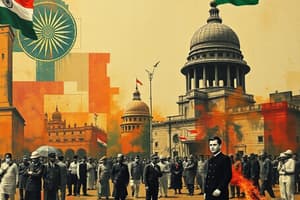Podcast
Questions and Answers
What was the primary goal of nationalism in India?
What was the primary goal of nationalism in India?
- To unite the people and gain independence from British rule (correct)
- To increase the power of local monarchies
- To develop a new economic system
- To promote British culture
Which phase of nationalism in India was characterized by petitions and constitutional methods?
Which phase of nationalism in India was characterized by petitions and constitutional methods?
- Gandhian phase
- Extremist phase
- Reformist phase
- Moderate phase (correct)
Which of the following events is associated with the demand for immediate independence from British rule?
Which of the following events is associated with the demand for immediate independence from British rule?
- Non-cooperation movement
- Civil Disobedience Act
- Swadeshi movement
- Quit India movement (correct)
Who was a prominent leader during the Gandhian phase of nationalism?
Who was a prominent leader during the Gandhian phase of nationalism?
What was a key factor leading to India's nationalism?
What was a key factor leading to India's nationalism?
Which nationalist leader is associated with the Indian National Army?
Which nationalist leader is associated with the Indian National Army?
What approach did the extremist phase primarily advocate for?
What approach did the extremist phase primarily advocate for?
Which movement involved a mass boycott of British goods?
Which movement involved a mass boycott of British goods?
Flashcards are hidden until you start studying
Study Notes
Definition and Emergence
- Nationalism in India refers to the movement that sought to unite the people of India and gain independence from British colonial rule.
- Emerged in the late 19th century, influenced by the Indian Renaissance and the Indian Rebellion of 1857.
Factors Contributing to Nationalism
- Economic factors: Exploitation of Indian resources, drain of wealth, and poverty.
- Political factors: Denial of civil rights, lack of representation, and discriminatory laws.
- Social factors: Racial superiority, cultural imperialism, and social segregation.
- Cultural revival: Rediscovery of India's rich cultural heritage, including its history, literature, and art.
Phases of Nationalism
- Moderate phase (1870s-1905): Led by moderates like Dadabhai Naoroji, R.C. Dutt, and Gopal Krishna Gokhale. Focus on petitions, representations, and constitutional methods.
- Extremist phase (1905-1917): Led by extremists like Bal Gangadhar Tilak, Lala Lajpat Rai, and Bipin Chandra Pal. Focus on agitation, protest, and boycott.
- Gandhian phase (1917-1947): Led by Mahatma Gandhi. Focus on non-violent resistance, civil disobedience, and mass mobilization.
Key Events and Movements
- Swadeshi movement (1905): Boycott of British goods and promotion of Indian industries.
- Non-cooperation movement (1920-1922): Mass boycott of British institutions and goods.
- Quit India movement (1942): Demand for immediate independence and an end to British rule.
- Indian National Congress: Founded in 1885, served as a platform for nationalist leaders and movements.
Nationalist Leaders
- Mahatma Gandhi: Led the Gandhian phase of nationalism, emphasizing non-violent resistance and civil disobedience.
- Jawaharlal Nehru: Key figure in the Indian independence movement, served as the first Prime Minister of India.
- Subhas Chandra Bose: Led the Indian National Army, a military force that fought against British rule.
- Bhagat Singh: Revolutionary nationalist who fought against British rule and was executed in 1931.
Impact and Legacy
- Indian independence (1947): Nationalist movement culminated in India's independence from British rule.
- Shaping of Indian identity: Nationalist movement helped shape India's national identity and promote a sense of unity among its diverse people.
Definition and Emergence
- Nationalism in India sought to unite Indians and gain independence from British colonial rule, emerging in the late 19th century.
Factors Contributing to Nationalism
- Economic factors: British exploitation of Indian resources led to a drain of wealth and widespread poverty.
- Political factors: Indians were denied civil rights, lacked representation, and faced discriminatory laws.
- Social factors: Racial superiority, cultural imperialism, and social segregation fueled Indian resentment towards British rule.
- Cultural revival: Indians rediscovered their rich cultural heritage, including history, literature, and art.
Phases of Nationalism
Moderate Phase (1870s-1905)
- Leaders: Dadabhai Naoroji, R.C.Dutt, and Gopal Krishna Gokhale.
- Methods: Petitions, representations, and constitutional means.
Extremist Phase (1905-1917)
- Leaders: Bal Gangadhar Tilak, Lala Lajpat Rai, and Bipin Chandra Pal.
- Methods: Agitation, protest, and boycott.
Gandhian Phase (1917-1947)
- Leader: Mahatma Gandhi.
- Methods: Non-violent resistance, civil disobedience, and mass mobilization.
Key Events and Movements
- Swadeshi movement (1905): Boycotted British goods and promoted Indian industries.
- Non-cooperation movement (1920-1922): Mass boycotted British institutions and goods.
- Quit India movement (1942): Demanded immediate independence and an end to British rule.
- Indian National Congress: Founded in 1885 as a platform for nationalist leaders and movements.
Nationalist Leaders
- Mahatma Gandhi: Led the Gandhian phase, emphasizing non-violent resistance and civil disobedience.
- Jawaharlal Nehru: Key figure in the Indian independence movement, served as India's first Prime Minister.
- Subhas Chandra Bose: Led the Indian National Army, fighting against British rule.
- Bhagat Singh: Revolutionary nationalist who fought against British rule and was executed in 1931.
Impact and Legacy
- Indian independence (1947): Nationalist movement culminated in India's independence from British rule.
- Shaping of Indian identity: Nationalist movement helped shape India's national identity and promote unity among its diverse people.
Studying That Suits You
Use AI to generate personalized quizzes and flashcards to suit your learning preferences.




